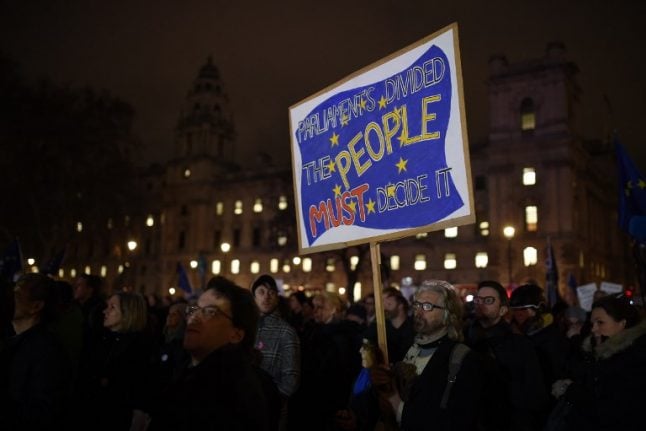A huge majority of UK parliamentarians rejected Theresa May's Brexit deal on Tuesday evening, leaving the government's plan for the UK's exit from the EU in tatters and the future of 1.2 million Brits in Europe shrouded in yet more doubt.
LIVE: Brits in EU demand to be spared from Brexit 'train crash' after May's deal rejected
More than two thirds of MPs voted against the Brexit deal, known as the Withdrawal Agreement. The numbers represented a crushing defeat for the PM: 202 voted in favour of the agreement but a staggering 432 MPs voted against.
This is the biggest defeat in British political history in the last hundred years. The previous record was 166. Our time is NOW. Join the fight: https://t.co/5oM0unY4kH
— Best For Britain (@BestForBritain) January 15, 2019
The Labour leader Jeremy Corbyn seized on the government's massive defeat, the largest for any government since the 1920s, to call for a vote of no-confidence.
MPs will now debate whether they have confidence in May's government on Wednesday January 16th.
Jean-Claude Juncker returned to Brussels early from meetings in Strasbourg, with May expected to seek a new round of meetings with the EU Commission and EU leaders to thrash out a new deal.
But Juncker was not hopeful and urged the UK to “clarify its intentions”.
“The risk of a disorderly withdrawal of the UK has increased with this evening's vote. While we do not want this to happen, we will continue our contingency work to help ensure EU is fully prepared,” Juncker said in a statement shortly after the vote.
I take note with regret of the outcome of the vote in the @HouseofCommons this evening. I urge the #UK to clarify its intentions as soon as possible. Time is almost up #Brexit https://t.co/SMmps5kexn
— Jean-Claude Juncker (@JunckerEU) January 15, 2019
Donald Tusk, the European Council president, outlined the Brexit impasse and suggested Brexit should be called off for the good of both the EU and the UK.
If a deal is impossible, and no one wants no deal, then who will finally have the courage to say what the only positive solution is?
— Donald Tusk (@eucopresident) January 15, 2019
Meanwhile the first thoughts of the president of the European Parliament Antonio Tajani was with those Britons in the EU and Europeans in the UK.
“The Brexit vote is bad news. Our first thoughts are with the 3.6 million EU citizens living in the UK and Britons living elsewhere in the EU. They need assurances with regards to their future. We will always stand by their side,” Tajani said.
While campaigners for the rights of the 1.2 million Britons in Europe expected the result their anger at being left in limbo by negotiators for 934 days was heightened by May's statement after the defeat.
Kalba Meadows from British in Europe and Remain in France Together told The Local: “There was no great surprise in the result but the sheer hypocrisy in Theresa May's statement afterwards was just breathtaking when she said 'People, particularly EU citizens who have made their home here and UK citizens living in the EU, deserve clarity on these questions as soon as possible.'
“We've been asking for clarity for over two years now, and neither she nor any of the DExEU Secretaries of State have been willing to meet us.
“I doubt there's one single EU citizen in the UK or UK citizen in the EU that didn't choke on those words. If she really wants to give us certainty, then she must push hard for the ring-fencing of our rights and do so now. It's the only just solution. Human lives must be taken out of this train crash”
How dare Theresa May say we need clarity. She has refused to ever meet us. Her Secretaries of State have refused to meet us. Do not use us now to prop up your position.
— British in Europe (@BritishInEurope) January 15, 2019
The group British in Italy were similarly outraged.
Theresa May has lost the vote tonight. She now needs to ask the EU to commit, together with her government, to implement what they both painstakingly agreed on citizens’ rights last year in an international treaty – whatever happens next. 1/ pic.twitter.com/HuRuLMLEPi
— British in Europe (@BritishInEurope) January 15, 2019
Citizens' rights campaigners called on Theresa May, who name-checked UK nationals in Europe shortly after the heavy defeat in parliament, to return to Brussels and strike a deal for their rights.
You are right, @theresa_may @the3million and @BritishInEurope do need clarity. Go back to Brussels and offer to ring fence our rights tomorrow. https://t.co/ue7Ref4fjB
— Fiona Godfrey (@fjgodfrey) January 15, 2019
But Theresa May may not be in a position to renegotiate any deal. First of all her government has to survive Wednesday's confidence vote.
It may be a long time yet before Britons in Europe get any clarity over their futures.



 Please whitelist us to continue reading.
Please whitelist us to continue reading.
“Lawmakers in the UK parliament overwhelmingly rejected Theresa May’s Brexit deal on Tuesday evening sparking frustration among EU leaders” – That’s pretty awesome news!
“The numbers represented a crushing defeat for the PM: 202 voted in favour of the agreement but a staggering 432 MPs voted against.
…the government’s massive defeat, the largest for any government since the 1920s”
Beautiful! The woman (May) is evil and it’s about time to revolt against her.
Brexit is wrong. The UK must NOT leave the EU. The UK needs the EU and God help us, the EU definitely needs the UK.